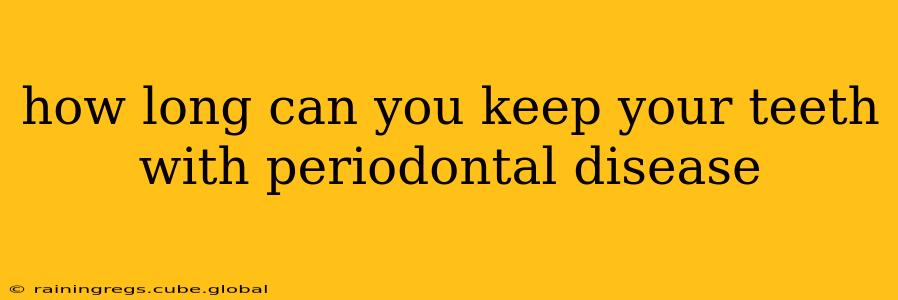Periodontal disease, also known as gum disease, is a serious infection that damages the soft tissues and bone that support your teeth. The question of how long you can keep your teeth with periodontal disease is complex and depends on several crucial factors. There's no single answer, as the progression and severity of the disease vary greatly from person to person. However, understanding the disease, its stages, and available treatments is key to preserving your oral health for as long as possible.
What are the Stages of Periodontal Disease?
Periodontal disease progresses through several stages:
-
Gingivitis: This is the earliest and most reversible stage. Gums become inflamed, red, swollen, and may bleed easily. At this stage, bone loss hasn't occurred yet. With proper hygiene and professional cleaning, gingivitis can often be completely reversed.
-
Periodontitis: This is the more advanced and irreversible stage. It's characterized by the destruction of the tissues and bone supporting the teeth. Bacteria accumulate below the gum line, causing inflammation and infection. This leads to periodontal pockets (spaces between the teeth and gums), bone loss, and potentially tooth loss. Periodontitis is further classified into different stages based on the severity of bone loss and pocket depth.
How Does Periodontal Disease Lead to Tooth Loss?
The chronic inflammation caused by periodontitis gradually destroys the bone and connective tissues that hold your teeth in place. As the supporting structures weaken, teeth become loose and eventually fall out or require extraction. The deeper the pockets and the more significant the bone loss, the greater the risk of tooth loss.
What Factors Influence How Long You Can Keep Your Teeth?
Several factors influence how long someone can keep their teeth with periodontal disease:
-
Severity of the disease: The earlier the disease is detected and treated, the better the chances of preserving your teeth. Advanced periodontitis with significant bone loss presents a greater challenge.
-
Individual response to treatment: Some individuals respond better to treatment than others. Factors like overall health, genetics, and lifestyle choices can influence treatment success.
-
Compliance with treatment: Regular professional cleanings, consistent home oral hygiene, and adherence to any prescribed treatment plan are essential for managing periodontal disease and preventing further damage.
-
Overall health: Conditions like diabetes and smoking can significantly increase the risk of periodontal disease and impair healing.
-
Access to dental care: Regular dental checkups and prompt treatment are crucial for early detection and effective management.
How Can You Protect Your Teeth from Periodontal Disease?
Prevention is key. Practicing excellent oral hygiene, including regular brushing, flossing, and using an antimicrobial mouthwash, can significantly reduce the risk of periodontal disease. Regular dental checkups and professional cleanings are also essential for early detection and treatment.
Can Periodontal Disease Be Reversed?
While the bone loss associated with periodontitis is irreversible, the progression of the disease can often be slowed or stopped with proper treatment. This typically involves professional cleaning (scaling and root planing), antibiotics (in some cases), and sometimes surgery.
What Treatments are Available for Periodontal Disease?
Several treatments are available to manage and control periodontal disease, including:
-
Scaling and root planing: This involves removing plaque and tartar from above and below the gum line and smoothing the tooth roots to reduce bacterial accumulation.
-
Antibiotics: In some cases, antibiotics may be prescribed to control infection.
-
Surgery: In advanced cases, surgical procedures may be necessary to regenerate bone and tissue or improve pocket depth.
-
Guided tissue regeneration (GTR): This procedure uses special membranes to promote tissue and bone growth around the teeth.
-
Bone grafting: This involves replacing lost bone tissue to support the teeth.
What Happens if You Lose Teeth Due to Periodontal Disease?
Tooth loss due to periodontal disease can have significant implications for your oral health, including difficulty chewing, changes in speech, and a potential impact on your self-esteem. However, options for replacing missing teeth are available, including dentures, bridges, and dental implants.
In conclusion, the length of time you can keep your teeth with periodontal disease depends on various factors. Early detection, consistent treatment, and diligent home care are paramount. By actively managing the disease and working closely with your dentist, you can significantly improve your chances of preserving your natural teeth for many years to come.
